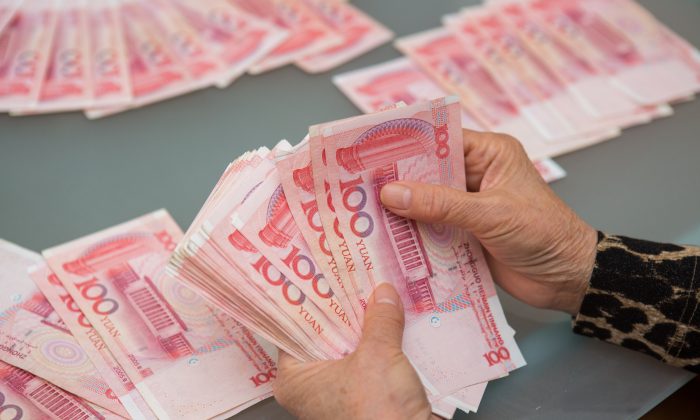McConnell Criticizes Impeachment Inquiry as ‘Kangaroo Court’ in Fundraising Pitch
China’s volume of international trade in its own yuan (renminbi or RMB) currency plunged by 11.82 percent in September on fading confidence in its financial stability.
The Society for Worldwide Interbank Financial Telecommunication (SWIFT) that dominates secure tracking of global interbank transactions for more than 11,000 financial institutions in over 200 nations reported that despite international trade payments volume up 0.19 percent in September over August, cross-border transaction volumes in China’s yuan were down by 11.82 percent.
The Governor of the People’s Bank of China Zhou Xiaochuan announced a package of financial liberalization reforms in October 2017, in concert with the International Monetary Fund approving the yuan in its Special Drawing Rights basket of currencies that includes the U.S. dollar, the euro, British pound and Japanese yen.
The IMF approval was the capstone on a multi-year effort to dramatically improve the attractiveness for foreign money managers to invest in China that included the launch of a global financial markets “connect” trading programs with the Hong Kong Exchange and Morgan Stanley Capital adding China domestic company shares to its indexes.
By August, the number of banks accepting yuan payments had risen by 11.31 percent to 2,214 and volume of trade conducted in yuan hit 2.22 percent. That established the yuan as the world’s fifth most active currency for trade, although its use remained far behind the U.S. dollar which accounted for 42.52 percent of trade volumes.
The steady rise of yuan usage allowed Chinese banks to directly finance substantially more trade payments without being forced to post collateral with foreign Eurodollar banks to guarantee the exchange of the yuan into U.S. dollars for complete customer payments. Many Wall Street analysts credited the rise of yuan transactions as a tangible recognition of China’s financial stability.
But SWIFT warned in its “RMB Tracker” report for the month of August that Hong Kong was the largest global yuan-clearing center with 76.36 percent share of all yuan transaction activity outside mainland China. With Hong Kong accounting for 25.13 percent of all global foreign exchange transactions and almost all of China’s FX transactions, the yuan’s acceptance overwhelmingly relied on foreign banks’ confidence in Hong Kong’s stability.
However, Hong Kong has been beset by a series of protests since 2014 regarding the Chinese regime failing to respect the Special Administrative Region rights of its residents. In June this year, anti-government demonstrations erupted over a now-withdrawn extradition bill and has shown no signs of abating. Protesters have expanded their demands to include universal suffrage in city elections and accountability for police use of force.
The IMF issued a report stating that China’s domestic savings rate, which peaked in 2008 at more than double the world’s average of about 25 percent of GDP, was declining rapidly due to an aging population. The IMF predicted that with China suffering its first balance of payments deficit in 25 years, it must borrow huge amounts of foreign cash to maintain the size of its economy.
The two-year rise in the acceptance of the yuan to clear cross-border trade was driven by increasing confidence in the financial stability of China’s economy and the unique effectiveness of Hong Kong as its foreign exchange trading center. The September loss of confidence in China’s long-term stability is directly related to the plunge in acceptance of the yuan to clear cross-border trades.
Chriss Street is an expert in macroeconomics, technology, and national security. He has served as CEO of several companies and is an active writer with more than 1,500 publications. He also regularly provides strategy lectures to graduate students at top Southern California universities.
This article is from the Internet:China International Trade in Its Yuan Currency Plunges by 11.82%: Report
House Intelligence Chair Adam Schiff Says He Wasn’t Told About al-Baghdadi Raid
